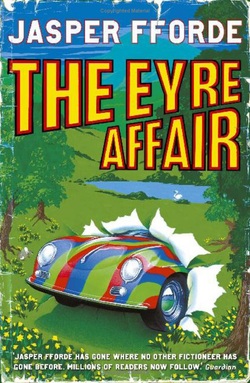
Author: Jasper Fforde
# pages: 374
Date Published: 2001
Rating: 3.5 out of 5 stars
Recommend: Yes
The Eyre Affair takes us to an alternate-universe England, a place where everyday life offers everything from reverse genetic-engineering to time travel and classic literature is the focus of pop culture. Thursday Next, the novel’s protagonist, is an agent for Litera Tec, a branch of the British government that handles crimes literature-related crimes: everything from high-scale Shakespeare forgeries to black-market poetry-trafficking. In the world of Thursday Next, people are very serious about their literary works.
Unfortunately for Litera Tec, the antagonist of the novel, Acheron Hades, acquires a new technology and begins dragging fictional characters out of their respective novels and into the “real world” (or the world of The Eyre Affair), including Jane Eyre, as suggested by Fforde’s title.
On the most basic level, The Eyre Affair is a book about books. But it is so much more than that, spanning several genres, including mystery, thriller, science-fiction and humor, all while retaining a constant ingenuity.
For instance, the world building in this book is phenomenal. Fforde creates a setting that is at once familiar and foreign, weaving together twisted references to literary, historical and pop culture in our world with the small, odd details of his alternate England to create a unique sense of place. For example, the Crimean War plays a much larger role in the world of The Eyre Affair than it did in real life and the main protagonist’s pet is a re-engineered Dodo bird.
However, these various parts fit together well and, as a person who loves reading, it was both surprising and gratifying to see a world in which the theft of first-edition prose or the appearance of a new play by a famous playwright is an issue of national importance.
The Eyre Affair does take a lot of effort on the part of the reader. Fforde’s frequent references to historical people, events and literary works left me baffled at first. For instance, when he brought up Martin Chuzzlewit by Charles Dickens, I felt I actually had to go look up a plot summary of that book to fully understand the happenings of The Eyre Affair. I then found myself repeating this brief research every five pages or so. While I might have been able to simply skim over the references, much of the novel’s meaning would have been lost, and I wouldn’t have fully followed or appreciated it. Therefore, while The Eyre Affair can take some time and devotion to read, it proves itself well worth the effort.
Review by Julia Walker, A&S '16

 RSS Feed
RSS Feed
